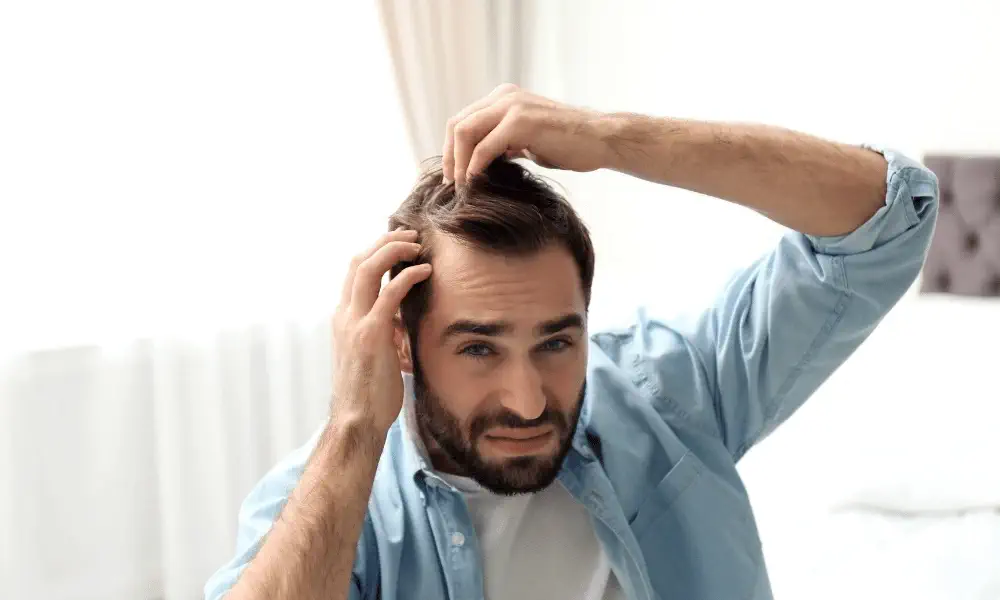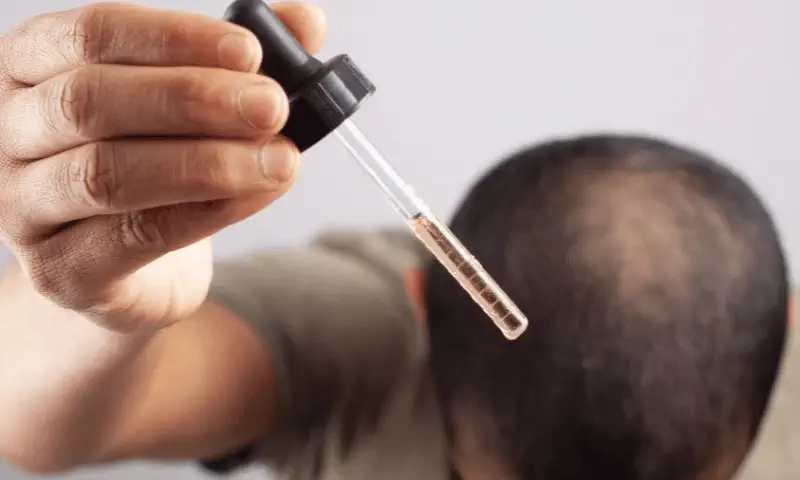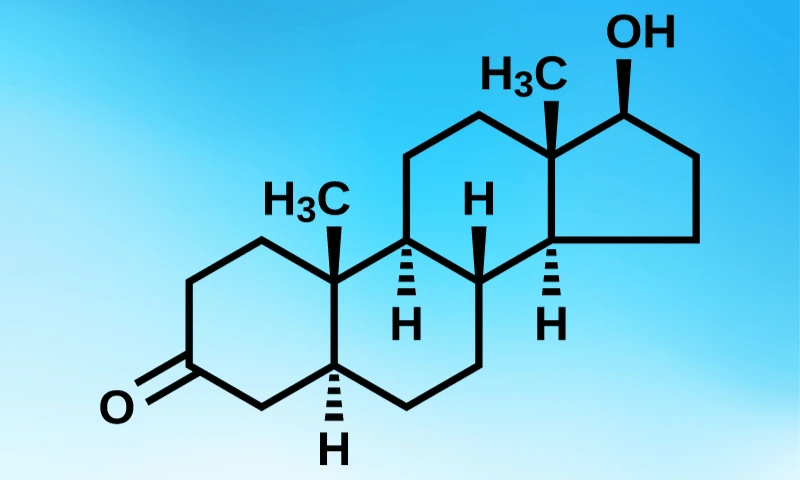
13 Oct Blocking DHT to Regrow Hair – Does It Work? 4 Remedies Examined
Sex hormones are often the most significant underlying cause that worsens male pattern hair loss.
DHT or Dihydrotestosterone is an androgen or a sex hormone that contributes to the development of male characters including their body hair. But somehow it can also make you lose hair quickly.
That’s why blocking dihydrotestosterone (DHT) is a common approach in the treatment of hair loss, particularly in cases of androgenetic alopecia.
Androgenetic alopecia is a common hair loss in men and women, typically known as male pattern baldness or female pattern baldness.
As androgenetic alopecia(AGA) is triggered by genetic concerns, DHT plays a significant role in its development and progression.
Today, you will get the most significant analysis of does blocking DHT regrow hair and how it impacts hair loss.
Understanding DHT and Hair
Dihydrotestosterone (DHT) is a hormone derived from testosterone, the primary male sex hormone.
The hormone is produced in the body through the action of an enzyme called 5-alpha reductase, which converts testosterone into DHT.
DHT is a potent androgen, meaning it has masculinizing effects. However, it plays key roles in both males and females.
One of the most significant roles that we need to discuss here is its contribution to androgenetic alopecia. Dihydrotestosterone (DHT) inevitably leads to Androgenetic Alopecia (AGA).
DHT is known to play a role in hair loss. In people with androgenic alopecia, also known as male-pattern baldness, the hair follicles on the scalp are more sensitive to DHT.
When DHT binds to the androgen receptors on these hair follicles, it can cause them to shrink and shorten the hair growth cycle, which can lead to thinner hair and eventually baldness.
This is why people who use synthetic hormones keep finding new ways to stop hair loss after steroid cycle.
Steroids or synthetic hormone results in an excess amount of testosterone, which get converted into DHT and causes hair loss.
So, do you think blocking DHT regrows hair?
Does Blocking DHT Regrow Hair?
Yes, blocking DHT can regrow hair. DHT is a hormone that causes hair follicles to shrink and shorten the hair growth cycle. By blocking DHT, you can prevent hair loss and even promote hair regrowth.
There are two significant ways through which DHT blocker helps in:
1. Slowing Hair Loss
As per studies published in the PRS Global Open, DHT is held responsible for the miniaturization of hair follicles in AGA.
By blocking DHT, you definitely can prevent hair loss and ultimately support hair growth. DHT is a hormone that can shrink hair follicles in individuals with a genetic predisposition to AGA.
By blocking DHT or reducing its effects on hair follicles, it is possible to slow down the process of hair follicle miniaturization.
This eventually helps the existing hair to become thicker and healthier, and further hair loss may delayed.
2. Promoting Hair Regrowth
In some cases, when hair follicles are not severely miniaturized and have not completely died off, there may be chances that blocking DHT enhances growth.
Several studies support the fact that blocking DHT can stimulate the regrowth of finer, vellus-like hairs (peach fuzz) or even thicker terminal hairs.
A study published in Expert Opinion on Investigational Drugs, suggests that clinical trials conducted on men experiencing baldness have substantiated that finasteride effectively lowered DHT levels on the scalp and enhanced hair growth.
Further, this regrowth is more likely to occur in areas where hair follicles are still active but produce thin and weak hairs.
However, It is important to note that blocking DHT will not regrow all lost hair. It is also important to use DHT blockers consistently to maintain results.
According to a study published in the Journal of Cosmetic Dermatology, If you stop using DHT blockers, your hair loss may resume.
Overall, we’ve got a basic overview of does blocking DHT regrows hair and whether it prevents hair loss or not.
How to Block DHT and Regrow Hair Naturally?

There are many best hair supplements, medications, and specific ways that help in blocking DHT naturally to inhibit the loss of hair with DHT.
These methods can be preferred by an individual who has recently started facing hair loss due to DHT.
By blocking the DHT, there are certain methods you can ensure the regrowth of natural hair, only if the hair follicles are not completely dead.
Here are some of the methods that you should know to remove DHT from the scalp permanently.
1. Medications (Finasteride, Dutasteride)
According to a study published in Drugs, medications like finasteride and dutasteride can help regrow hair by blocking the hormone dihydrotestosterone (DHT).
This inevitably plays a key role in accelerating the loss of hair due to androgenic alopecia in both males and females.
The 5-alpha-reductase inhibitor finasteride helps in blocking the conversion of testosterone to dihydrotestosterone (DHT).
When DHT levels are high, it can lead to miniaturization of the hair follicles, resulting in thinner and weaker hair.
By reducing DHT levels, finasteride and dutasteride can help reverse this miniaturization process and promote the regrowth of thicker and healthier hair.
2. Natural DHT blockers (Saw Palmetto, Pumpkin Seed Oil)
There are plenty of DHT blockers available in the market that claim to help in blocking or reducing dihydrotestosterone (DHT).
Saw Palmetto is derived from the Serenoa Rapens plant. It is well known for its properties and is a popular natural DHT blocker that is available in various forms such as powders and extracts.
Studies assure that it inhibits the enzyme 5-alpha-reductase, which is responsible for converting testosterone into DHT.
By reducing the levels of DHT, Saw Palmetto may help prevent hair follicle miniaturization and promote hair regrowth.
A study confirms that 48% of subjects experienced greater hair growth from topical saw palmetto, however, 36% of them reported no change.
3. Topical Treatments (Minoxidil)
Topical treatments are yet another method to regrow the hair that gets lost with the DHT.
Minoxidil is an over-the-counter (OTC) medication that is believed to work by dilating the blood vessels in the scalp, increasing blood flow to hair follicles.
Some additional studies can also signify the fact that it may also prolong the anagen (growth) phase of the hair follicle, leading to thicker and longer-lasting hair.
According to the Journal published by Drug Design, Development, and Therapy, the metabolite of minoxidil, minoxidil sulfate, and the enzyme that catalyzes the conversion, sulfotransferase, are primarily responsible for the drug’s favorable effects on hair growth.
4. Hair Transplant Procedures
Hair Transplant procedures are completely different methods to regrow the hair. However, there are some methods in which the chances of the blocking of DHT are also possible in some of the treating procedures.
However, there is no evidence to support such a claim. Hair transplant surgery works by relocating hair follicles from one area of the scalp (typically a donor area with healthy hair follicles) to another area with thinning or balding hair.
It is a surgical method of redistributing existing hair, and it does not address the underlying hormonal causes of hair loss.
After analyzing the common methods of “how to remove DHT from the scalp permanently” Let’s find out if there is any evidence supporting that blocking DHT does regrow hair.
Clinical Research About DHT and Hair Regrowth
Clinical evidence also supports how DHT blockers help in the regrowth of the hair naturally along with ensuring the free availability free testosterone in the body.
Review of Studies on DHT blockers and Hair Regrowth
According to a study published in Drugs, 1,879 men have demonstrated that oral finasteride at a daily dose of 1 mg promotes hair growth.
Also, the study supports the fact that it prevents further hair loss in a significant number of men with male pattern hair loss.
In men with vertex hair loss, 48% of finasteride users showed improved hair growth at one year.
However, comparing the data with the people at placebo, only 7% of the data support that some individuals experience the growth of new natural hair.
In addition to this, Hair counts also indicated that after two years, 83% of finasteride users had no further hair loss compared to baseline, while only 28% of placebo users experienced the same outcome.
A study published in the Journal of Investigative Dermatology Symposium Proceedings clearly shows that the use of finasteride in men with AGA can reduce median scalp dihydrotestosterone DHT levels by 69% after 42 days of treatment. Furthermore, Median serum DHT level was shown to decrease by 71% and 72%.
Another study published in the same journal, suggests treatment of AGA with finasteride in men can lead to an improvement in hair count and hair growth.
Furthermore, this study also observed that a dosage of 1 mg of finasteride is a safe option as it is well tolerated by patients.
However, in contrast to males, when it comes to females’ studies show that finasteride treatment shows no benefits in postmenopausal women with AGA.
So, if you are a man, you can go for DHT blockers like finasteride without any doubts as it is backed by science.
However, along with using these DHT blocking methods, one should also focus on their eating diets and eating habits because some foods cause hormonal imbalance, and hormonal imbalance leads to hair loss.
Success Rates and Potential Side Effects
Blocking dihydrotestosterone (DHT) is a common approach to promote hair growth and prevent hair loss.
The above-mentioned data further replicates the facts blocking DHT contributes to preventing hair follicle miniaturization and stopping eventual hair loss in genetically predisposed individuals.
Furthermore, those studies also support the fact that using DHT blockers like finasteride in men with AGA can lead to a significant decrease in DHT levels and an improvement in hair count. Whereas women with AGA don’t seem to benefit from it.
When it comes to the dosage, according to the above-mentioned studies 1 mg of finasteride is considered safe as the subjects seem to handle it properly.
By following up the recommended dosage the chances of getting success will significantly be higher.
Nevertheless, it’s a safe way to balance the free testosterone levels in men and the regrowth of the hair.
Long-Term Effects of DHT Blockers on Hair Growth

Dihydrotestosterone (DHT) blockers, such as finasteride and dutasteride, can have long-term effects on hair growth. These medications work by inhibiting the conversion of testosterone into DHT.
While DHT blockers can be effective at preserving existing hair, their ability to regrow lost hair is limited.
Some users may experience modest regrowth, particularly in the early stages of hair loss. However, the extent of regrowth varies from person to person.
Conclusion
Overall, the evidence does suggest blocking DHT does regrow hair in individuals. But we also suggest that do not completely rely on the DHT-blocking medications for hair growth as they are not the guaranteed method for regrowing lost hair.
However, the regrowth of hair often among individuals depends on various factors. These factors combine the extent of hair loss, the duration of treatment, and individual genetics.
Some individuals may experience noticeable regrowth, while others may see more modest results or simply maintain the hair they have.
For those seeking significant hair regrowth, we suggest that a consultation with a healthcare provider or dermatologist is essential to develop a personalized hair loss management plan.



No Comments